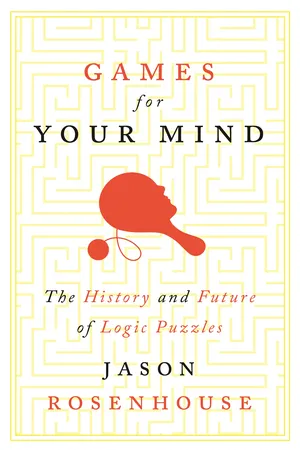
- English
- ePUB (mobile friendly)
- Available on iOS & Android
About this book
A lively and engaging look at logic puzzles and their role in mathematics, philosophy, and recreation
Logic puzzles were first introduced to the public by Lewis Carroll in the late nineteenth century and have been popular ever since. Games like Sudoku and Mastermind are fun and engrossing recreational activities, but they also share deep foundations in mathematical logic and are worthy of serious intellectual inquiry. Games for Your Mind explores the history and future of logic puzzles while enabling you to test your skill against a variety of puzzles yourself.
In this informative and entertaining book, Jason Rosenhouse begins by introducing readers to logic and logic puzzles and goes on to reveal the rich history of these puzzles. He shows how Carroll's puzzles presented Aristotelian logic as a game for children, yet also informed his scholarly work on logic. He reveals how another pioneer of logic puzzles, Raymond Smullyan, drew on classic puzzles about liars and truthtellers to illustrate Kurt Gödel's theorems and illuminate profound questions in mathematical logic. Rosenhouse then presents a new vision for the future of logic puzzles based on nonclassical logic, which is used today in computer science and automated reasoning to manipulate large and sometimes contradictory sets of data.
Featuring a wealth of sample puzzles ranging from simple to extremely challenging, this lively and engaging book brings together many of the most ingenious puzzles ever devised, including the "Hardest Logic Puzzle Ever," metapuzzles, paradoxes, and the logic puzzles in detective stories.
Frequently asked questions
- Essential is ideal for learners and professionals who enjoy exploring a wide range of subjects. Access the Essential Library with 800,000+ trusted titles and best-sellers across business, personal growth, and the humanities. Includes unlimited reading time and Standard Read Aloud voice.
- Complete: Perfect for advanced learners and researchers needing full, unrestricted access. Unlock 1.4M+ books across hundreds of subjects, including academic and specialized titles. The Complete Plan also includes advanced features like Premium Read Aloud and Research Assistant.
Please note we cannot support devices running on iOS 13 and Android 7 or earlier. Learn more about using the app.
Information
PART II
Lewis Carroll and Aristotelian Logic
CHAPTER 3
Aristotle’s Syllogistic
3.1 The Beginning of Formal Logic
We must first state the subject of our inquiry and the faculty to which it belongs: its subject is demonstration and the faculty that carries it out demonstrative science. We must next define a premise, a term, and a syllogism, and the nature of a perfect and of an imperfect syllogism; and after that, the inclusion or noninclusion of one term in another as in a whole, and what we mean by predicating one term of all, or none, of another.A premise, then, is a sentence affirming or denying one thing of another. This is either universal or particular or indefinite. By universal I mean the statement that something belongs to all or none of something else; by particular that it belongs to some or not to some or not to all; by indefinite that it does or does not belong, without any mark to show whether it is universal or particular. (Aristotle 2001, 65)
Table of contents
- Cover
- Title Page
- Copyright
- Contents
- Preface
- I: The Pain and Pleasure of Logic
- II: Lewis Carroll and Aristotelian Logic
- III: Raymond Smullyan and Mathematical Logic
- IV: Puzzles Based on Nonclassical Logics
- V: Miscellaneous Topics
- Glossary
- References
- Index